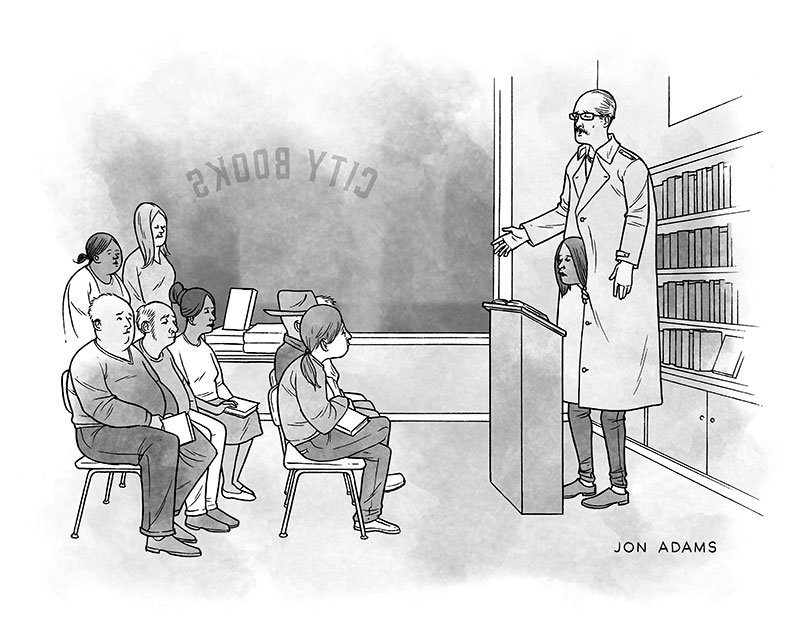 Jon Adams’ cartoon is set at an author event in a bookstore. The author sits on the shoulders of a woman. He’s wearing a long trench coat that reaches the woman’s knees and is, I imagine, supposed to conceal the woman. But she’s destroying the illusion by peeking out of the coat at the audience. The man is speaking.
Jon Adams’ cartoon is set at an author event in a bookstore. The author sits on the shoulders of a woman. He’s wearing a long trench coat that reaches the woman’s knees and is, I imagine, supposed to conceal the woman. But she’s destroying the illusion by peeking out of the coat at the audience. The man is speaking.
Authors typically take questions from the audience, but because most people would want to ask about the woman behind the coat, I imagined the author saying, “Any questions? About my book, I mean.”
I next came up with a couple of variations on the way a man recognized for his accomplishments acknowledges his wife’s contributions to his success:
- “Throughout this process, my wife has been incredibly supportive.”
- “I wouldn’t be here without my wife’s support.”
The now common practice of using a plural pronoun to refer to a single person (a practice that I, as an old white man, am still getting used to) led to my final caption: “My preferred pronoun is they.”
Now let’s see how you did.
I’ll begin with the week’s best puns:
- “Tonight I’ve brought a real page-turner.”
- “We started the Me Two movement.”
- “That’s my wife. She’s an underwriter.”
That last caption would be far better and punchier without the first sentence.
Many of your entries focused on the fact that the author is sitting (or maybe standing) on the shoulders of a woman, who may or may not be his wife:
- “I wouldn’t be up here without the support of my wife.”
- “I don’t know where I’d be today without my wife’s support.”
- “I stand on the shoulders of Faulkner, Hemingway, and Marcia.”
- “Under every great man is a great woman.”
Several of you referred to the Q&A sessions that follow most public readings:
- “Surely you have some questions.”
- “Really? No one has any questions?”
- “Does anyone have a question about the book?”
That last caption is similar but superior to one of mine.
Because the following caption (or a variation on it) has been submitted for several CartoonStock contests and even been selected once as the winner, I’m reluctant to highlight it. Still, it does work: “My eyes are up here.”
This caption suggests that the woman is not supporting the man on her shoulders but is instead growing out of his midsection, the result of a horrible nuclear accident that released lethal doses of radiation: “And that’s when we left Chernobyl.”
Like I did, a couple of you made a joke about preferred pronouns:
- “My pronouns are they/them.”
- “I identify as they.”
I’ll conclude this week’s commentary with four strong entries that don’t fit neatly into any category:
- “I will be reading you a chapter from my new book, Raising An Independent Teen.”
- “Writing in the second person comes naturally.”
- “I’ve discovered the writer within.”
- “This book was co-authored.”
This week’s winner is, “I stand on the shoulders of Faulkner, Hemingway, and Marcia.”
Lawrence Wood has won The New Yorker’s Cartoon Caption Contest a record-setting seven times and been a finalist four other times. He has collaborated with New Yorker cartoonists Peter Kuper, Lila Ash, Felipe Galindo Gomez, and Harry Bliss (until Bliss tossed him aside, as anyone would, to collaborate with Steve Martin). Nine of his collaborations have appeared in The New Yorker, and one is included in The New Yorker Encyclopedia of Cartoons.

